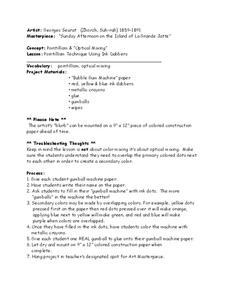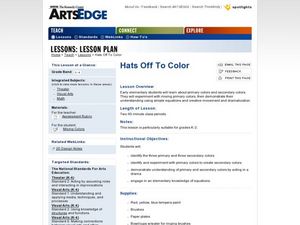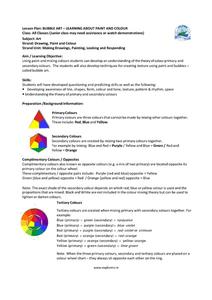Curated OER
The Color Wheel
Hand out this nifty resource to make your next lesson on the color wheel a snap. It is a picture of the color wheel alongside a description of primary, secondary, and mixing colors. Great for artists of any age.
Curated OER
Counting Coloring Puzzle
If your kids enjoy color-by-number, they will be excited about this learning exercise! Using a color key, they match numbers on a picture of a bee by coloring them the corresponding shade. There is a trick here: although the number 10 is...
Curated OER
Shaping the Color Wheel
When you paint you almost always use color. Budding artists explore the color wheel, color vocabulary, and painting techniques. They discuss and practice mixing colors, then paint a color wheel for personal reference.
Curated OER
Pointillism Technique Using Ink Dabbers
A gumball machine art project is a great way to learn about optical mixing in a study of pointillism and Georges Seurat. Kids create their own masterpieces and learn about primary and secondary colors in the process.
Curated OER
Mixing Primary and Secondary Colors
Students create their own color wheel by mixing colors of Playdoh. Each child names the primary and secondary colors.
Curated OER
Color Mixing/ Fantastic Shapes in Paining
Young scholars paint shapes in pictures using all of the colors in the color wheel. For this colors lesson plan, students learn about primary and secondary colors, and create non representational art with the colors.
Curated OER
Flipping Butterflies: Triadic Colors and Symmetry
Second graders create symmetrical butterfly wings. In this symmetry instructional activity, 2nd graders observe butterfly wings and create their own. They make both sides symmetrical and mix primary colors to make secondary colors.
Curated OER
Mouse Painting (Color Mixing)
After reading the story Mouse Paint by Ellen Stoll Walsh, little ones make a mouse painting of their own. They discuss mixing colors, painting, and the story, then they "dance" with their fingers through puddles of paint.
Curated OER
Hats Off to Color
Students investigate primary and secondary colors. In this art lesson, students mix primary paint colors to develop secondary colors. Students identify each color they created.
Curated OER
Color Wheel Project
Students identify and describe the primary, secondary and tertiary colors.
They also identify the order in which these three categories of colors fit on the color wheel. Students then create a color wheel using any medium available...
Curated OER
The Color of Your Own
Students understand primary and secondary colors. For this lesson about colors, students explore where colors come from. Students paint a picture with the primary paint colors that the teacher has created. Students mix the primary paint...
Curated OER
What is It? Susie Sees!
Students explore the five senses. In this cross curriculum five senses lesson, students view an "I Can See Colors" PowerPoint presentation and sort items by color and shape. Students mix primary color paints to create secondary colors,...
Curated OER
Boogie Woogie Colors - Mondrian Painting
Students create art in the style of Piet Mondrian. They review works by Mondrian, identify primary and secondary colors and then use construction paper, cut strips of paper and paint to create a piece of art that incorporates geometric...
Curated OER
Exploring Neighborhoods through Art
Students explore neighborhoods. In this color and social studies cross-curriculum lesson, students listen to Harold and the Purple Crayon by Crockett Johnson, then compare and contrast neighborhoods. Students mix primary colors to make...
Curated OER
Spinning Color Wheels
Students are introduced to primary and secondary colors. Using cardboard, they make a wheel in which they divide into different pie sections to color with primary and secondary colors. To end the lesson, they spend time mixing two colors...
Curated OER
Mixing the Sea
Students explore and experience mixing primary colors to create secondary colors and how to create tonal effects by adding white or black to the mix. They discuss color "temperatures" and form opinions about the works of Monet as well as...
Marine Institute
Bubble Art – Learning About Paint and Color
To gain an understanding of color mixing theory and the color wheel, young artists draw a picture, mix up a batch of secondary colors to which they add dish soap, and using straws, bubble up the paint. They then press their drawings onto...
Curated OER
Tissue Paper Flowers
Here is a sweet and simple instructional activity that introduces young learners to the three primary colors; red, yellow, and blue. Through a discovery process, youngsters learn how to successfully identify these colors, and the many...
K-5 Math Teaching Resources
Mini Math Word Wall
Provide a little extra support for your emerging mathematicians with a personal word wall. Including graphics and images that support children with learning to count, identify colors and shapes, and read high frequency words, this
Curated OER
Red is the Word!
Through the use of stories, artwork, and the KidPix program, youngsters explore the color word red, and engage in activities around the word. Teaching kindergartners about the color words can be so much fun. This could be adapted for any...
Curated OER
Color Theory
Sixth graders explore the basics of color mixing with paint by creating secondary and tertiary colors. Individually, 6th graders create their own paintings based on a popular series of sculptures.
Art Institute of Chicago
Color Combinations
Explore color through an examination of pointillism and light. Class members view Georges Seraut's famous painting on a computer, zooming in and out to see the details and effects of the technique. They then cover how light and color are...
Curated OER
Play Doh Color Wheel
Students identify primary and secondary colors, and construct color wheels, using Play Doh in the three primary colors.
Curated OER
Weaving a Watercolor
Students examine the color wheel and work with watercolors. In this color lesson, students go over primary, secondary, and intermediate colors before watching a demonstration of watercolor brush techniques. They choose a shape to paint...

























